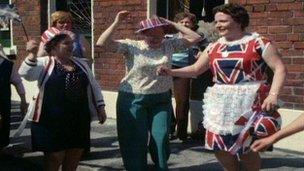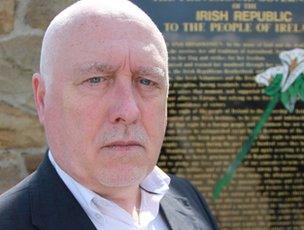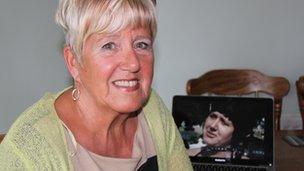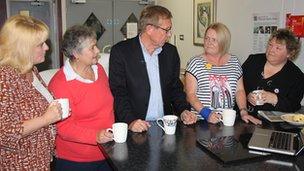NI jubilee visits: 1977 versus now
- Published
1977 ITV film - tight security and IRA checkpoints during Queen's visit
In 1977 I made a film for Thames Television about the Queen's Silver Jubilee visit to a Northern Ireland a world away from the place she is visiting today.
The programme was called In Friendship and Forgiveness, a title drawn from a speech the Queen made on that trip calling for people on both sides of the conflict to "live and work together in friendship and forgiveness".
It was due to be shown in peak time on the last day of her visit, but 10 minutes before transmission, ITV's broadcasting authority stopped the film. It subsequently trickled out over the network in a late night slot.
The ostensible reason was legal concerns over inflammatory words spoken by a Sinn Fein speaker at a Belfast rally who urged Irishmen to fight using whatever weapons they could get their hands on. In the end I had to quote his words as we were not allowed to hear his voice.

In 1977 the loyalists of the Shankill Road were as staunchly royalist as now
In 1977 security was so precarious that the Queen had to <link> <caption>overnight at sea and take her first ever helicopter flight to get into Belfast</caption> <url href="http://news.bbc.co.uk/onthisday/hi/dates/stories/august/10/newsid_2528000/2528727.stm" platform="highweb"/> </link> for a series of tightly screened engagements.
This time she will spend Tuesday night at Hillsborough Castle and on Wednesday will attend a free picnic for over 10,000 people from both traditions in the grounds of the Parliament buildings at Stormont.
When I visited Belfast last week, disappointed women on the loyalist Shankill Road told me that all of the tickets had gone in six minutes and some were now on sale on eBay for hundreds of pounds.
This was not the Belfast I visited, remembered and reported on in 1977.
Back then the people of the Shankill Road were similarly staunch in their royalist support. One local, Helen Gregg, spoke with fervour about what the Queen meant to her and her community:
1977 ITV film - riots break out in Belfast as republicans protest against the Queen's visit
"I've watched every news bulletin, I've read all the papers, and we're proud to be British and we're proud she's our Queen."
But, I also filmed an IRA checkpoint in West Belfast, lasting only a few minutes and largely a propaganda exercise, whilst the Queen was decorating faithful servants a few miles down the road at Hillsborough Castle.
I followed a black flag march down the republican Falls Road behind a banner that read "ER Queen of Death. 1969-77. 1,800 Dead". The banner failed to point out that the Provisional IRA had been responsible for almost half of them.
I watched the vicious riot that erupted at the end of the march when protesters were banned from entering Belfast city centre.
'Not our Queen'
I filmed the funeral of 16-year-old Paul McWilliams, a member of the Fianna, the junior wing of the IRA, who had been shot dead by the army the day before the Queen arrived, and I used footage of the burial in a Yorkshire mining village of 20-year-old Private Lewis Harrison, shot dead by an IRA sniper in retaliation on the same day.

Danny Morrison, who organised the anti-royalist black flag march, supports this royal visit
After Paul McWilliams' funeral I interviewed two republican women in Milltown cemetery about the Queen's visit. Mary McDermott, was scornful: "It's an intrusion into the affairs of the Irish people. We're not British subjects. She's not our Queen. We don't want her here at all."
Eileen Shaw, was equally dismissive: "I wouldn't give her any medals for coming over to Northern Ireland," she said. "I think I'm braver than her. I have to live here."
I have always believed - and still believe - that the broadcast of my report was stopped because its message was in direct conflict with the "spin" of the Labour government of the day, which wanted to present the Queen as the great healer of the division between loyalist and republican communities, whereas in fact historically she was the symbol of the division itself.
I remember one eminent ITV presenter doing a piece to camera high on a Belfast roof indicating that you could almost hear the peace in the air. Nothing could have been further from the truth.
Dublin visit effect
It is easy to forget and salutary to remember what things were like 35 years ago in those dark and violent days from which we have all come. It is this that makes the utter transformation of Northern Ireland all the more remarkable.
There are still dissident voices in sections of the republican community. Thirty-five years on from her scathing comments about the Queen's courage, I tracked down Eileen Shaw for Newsnight.

Eileen Shaw was scornful of the 1977 visit and is aghast at Martin McGuinness meeting the Queen
She remains as militant as ever and was derisive about the prospect of Martin McGuinness shaking hands with the Queen:
"Wake up and smell the coffee," she said. "You told those lads [the IRA] years and years ago - you don't recognise the court; you don't recognise the Queen. If he calls himself a republican, God help Ireland, that's all I can say".
But Danny Morrison, who organised the Queen of Death march in 1977, told me he welcomed her visit 35 years later.
He, like many other republicans, was impressed by the way the Queen carried out her visit to Dublin last year, laying a wreath at the Garden of Remembrance to those who died fighting for Irish independence from Britain.
He believes that it had paved the way for today: "It did actually have a healing effect in complete contrast to the 1977 visit where it was viewed as triumphalist."
Historic handshake
Helen Gregg died a few years ago but loyalist women I interviewed at the Shankill Women's Centre last week remained equally unshaken in their views and all of them welcomed Mr McGuinness' potentially historic handshake.
One, Betty Carlisle, also recognised that because Mr McGuinness had been a senior member of the IRA, the organisation responsible for the murder of Prince Philip's uncle, Lord Mountbatten, such a handshake would be a massive step for the Queen to take:

As in 1977, the women of the Shankill Road are pleased to see the Queen in Northern Ireland
"I feel optimistic," she said. "And I'm particularly happy for my children and my grandchildren."
In 1977 I never dreamed that one day I would see Martin McGuinness sharing power with Ian Paisley and about to shake hands with the Queen in a gesture of reconciliation that could not be more powerful in its significance for both communities.
In her address to the people of Northern Ireland in 1977, the Queen said, "I look forward to the day when we may return and enjoy with the people of Northern Ireland some of the better and happier times so long awaited and so richly deserved."
When Mr McGuinness shakes the Queen's hand, it will suggest that day may have finally come.
<bold>Watch Peter Taylor's full report on the Queen's jubilee visits of 1977 and this year on Newsnight at 10.30pm on BBC Two on Tuesday 26 June 2011 then afterwards on the BBC iPlayer and Newsnight website.</bold>
- Published26 June 2012
- Published22 June 2012
- Published22 June 2012